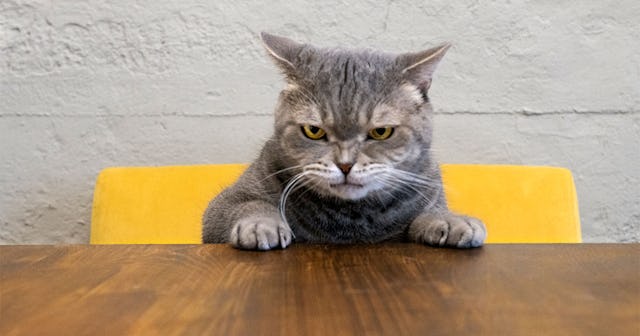Study Proves Cats Really Do Love Their Humans -- So Back Off, Haters

Despite their reputation for being aloof, cats are capable of having relationships with people
The age-old debate between Dog People and Cat People: which is the better, more affectionate pet? Many people might automatically gravitate toward dogs, because unlike cats, they’re not known for being aloof or independent. But a new study is shedding some light on the inner-workings of a cat’s psychology — and they’re far more capable of affection and relationships than you might have once thought.
Dogs are known as “man’s best friend,” sure, but that might not be an exclusive title anymore. New research shows that cats are just as strongly bonded to us as dogs and — interestingly — babies! While cat lovers may not be surprised by these findings, cats have not been considered social animals for most of history. Until now.
“I get that a lot — ‘Well, I knew that, I know that cats like to interact with me,’” said Kristyn Vitale, an animal behavior scientist at Oregon State University and lead author of the new study, tells The New York Times. “But in science, you don’t know that until you test it.”
Dr. Vitale says since scientists have been conflicted about whether cats do in fact form attachments to their owners and family members, she decided to design the study to explicitly test cats and their relationships with their humans. It’s the first in-depth social experiment for felines of its kind.
The researchers recruited the owners of 79 kittens and 38 adult cats in the experiment, which measured the bonds that dogs and primates form with their caretakers. A similar test is used for human babies, based on the theory that infants form an innate bond with caretakers that manifests as a strong desire to be near the person responsible for meeting their needs.
Which means that human babies aren’t the only living creatures to form secure attachments when their basic and emotional needs are met. Take the experiment itself, for example:
For the span of six minutes, the cat and kitten owners entered an unfamiliar room with their pets. After two minutes, the owner left the room, leaving the cat or kitten alone — which can totally stress out an animal. When the owner returned two minutes later, the researchers observed the cats’ response.
About two-thirds of cats and kittens came to greet their owners when they returned, and then went back to exploring the room, periodically returning to their owners. These animals, the researchers concluded, were securely attached to their owners, meaning they viewed them as a safe base in an unfamiliar situation.
About 35 percent of cats and kittens displayed insecure attachment, meaning they avoided their owners, or clung to them when they came back into the room. While this doesn’t mean these kitties have a bad relationship with their owner, it does mean they don’t see their owners as a source of security. It’s all very much like parents with their babies.
Dr. Vitale says she hopes to dive more deeply into the feline social construct and their relationships with their cat-loving humans, specifically in a way that could help them form early bonds with people and help them get adopted sooner.
“The more we find out about cats, the more we’re seeing that they are social creatures and that social bonds are really important for them,” she says.
This article was originally published on